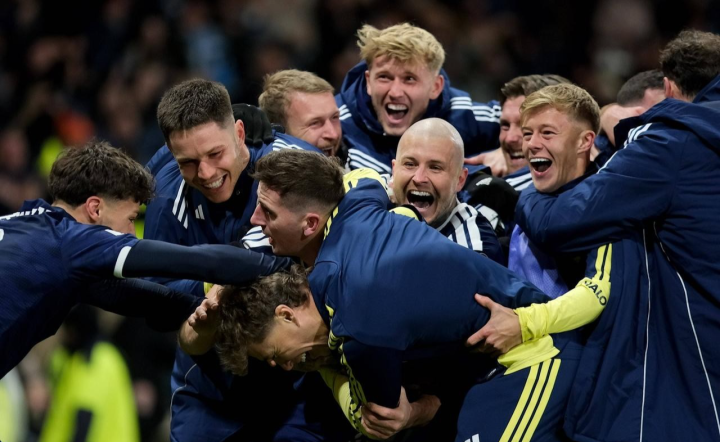AA-Sport > Football > Scotland writes World Cup legends with madness, they have waited too long for this night
Scotland writes World Cup legends with madness, they have waited too long for this night
When Kenny McLean lobbed the ball from the midfield line and the ball went over the head of Danish goalkeeper Schmeichel and fell into the empty goal, the cheers at Hampden Park almost lifted the night sky. On this night of November 18th, the Scottish men's football team returned to the World Cup stage after 28 years, and the way they advanced can be called the most absurd yet noble miracle example in football history - from being equalized by ten opponents to winning the game before the end, with three goals that could be recorded in history, they completely changed the "glorious failure" into a "crazy victory".

For Scottish fans, these 28 years of waiting are enough to span a generation of youth. The last time they stepped into the World Cup, most of today's core players were not yet born, and Hampden Park had seen countless hopes dashed. But on this night, all regrets were completely washed away by McTominay's overhead kick, Tierney's arc and McClean's lob. The blue and white flags waving in the stadium finally reflected the light of victory.
This 4-2 decisive battle against Denmark perfectly illustrates the "two-sidedness" of Scottish football. The first 70 minutes of the game were the ultimate in "nobility": when Denmark's Christensen left the field after receiving a second yellow card for a slight touch on McGinn, Scotland immediately took control of the situation. Old Manchester United player McTominay used an overhead kick that was comparable to Jermell's classic goal in 1978, sending the crowd into a frenzy. This midfielder who once struggled on the Manchester United bench has now become an idol in Naples, and the continued trust of Scottish coach Clark is the key to his counterattack.

But the absurdity of football immediately unfolded. In the 81st minute, ten-man Denmark equalized with Dolgu's goal, and the temperature in Hampton Park instantly dropped to freezing point. At that time, criticism had spread on social media: "I can't even defend against ten opponents, so I deserve to have my dream shattered again." But the Scotland team shattered the doubts with action. Left-back Tierney's left-footed curved ball from the edge of the penalty area hit the dead center and exceeded the score again. In stoppage time, McLean keenly caught the loophole of Schmeichel's forward position and decisively kicked off from the midfield to complete the victory, sealing the victory in the most satisfying way.
This victory is no accident, but a team miracle that Clark spent five years carefully building. When the 62-year-old coach took over, the Scotland team was in its darkest moment after failing to qualify for major competitions for 21 years, with less than half of the audience at home. He abandoned the flashy tactics and transformed the 4231 formation into a more pragmatic 352, allowing Robertson and Tierney, the pair of top full-backs, to form a "1+1>2" effect; more importantly, he insisted on giving opportunities to players in the trough - McLean was still the main force even after Norwich was relegated, and it was under his trust that McTominay regained his confidence. "I chose the right players and gave them countless opportunities to play, so they will definitely stand up at critical moments." Clark's words after the game told the truth.

The cohesion of this team is evident in the details. Captain Robertson said tearfully after the game: "This may be my last World Cup opportunity." He also specifically remembered his late friend Jota, "I know he must be smiling." Goal scorer McGinn said bluntly: "To be honest, we played poorly, but who cares? It's incredible to advance." From being "robbed" by Greece in the qualifiers, to being booed off the field by fans after winning, to now counterattacking and advancing, it is this spirit of "never give up, never give up" that has sustained them through their darkest moments.
Looking back at the bumpy journey of Scottish football, this promotion is even more landmark. They missed the chance to reach the top many times in the 1970s and 1980s, and they failed to win a single victory in the group stage in the last two European Cups. But the expansion of 48 teams has made the road to the World Cup brighter, and the "band of brothers" created by Clark has proven that the collective strength is enough to make up for the gap in individual talent. As McLean's buzzer beater shows, this team may not be perfect, but it is always full of surprises.

When the final whistle sounded, Clark was surrounded by players and raised the national flag, and the song at Hampden Park changed from "Flower of Scotland" to the World Cup theme song. After 28 years of waiting, three incredible goals, and an ups and downs reversal, Scotland told the world in its own way: the charm of football lies in its ability to allow the absurd and the sublime to coexist, and to blend regret and perfection. The stadiums of the US-Canada-Mexico World Cup will eventually echo with the screams of Scottish fans again.
Related Posts
Luo Ti: Juventus is interested in Brozovic, whose contract expires in June next year
FootballOn November 20, "Corriere dello Sport" reported that Juventus is interested in Brozovic. Brozovic's contract extension with Riyadh Victory is at a standstill, still awaiting a final answer. The Croatian midfielder has not agreed to ren...
【Football】
moreBrazilian media: Ancelotti used a total of 42 players in Brazil’s first 8 games, and Guimarães was the only one who was fully present
FootballNovember 20 According to statistics from Brazilian media globo, Ancelotti recruited and used a total of 42 players in the first 8 games of coaching the Brazilian national team. Among these 42 players, Newcastle midfielder Guimarães is the only playe...
【Football】
moreScotland writes World Cup legends with madness, they have waited too long for this night
FootballWhen Kenny McLean lobbed the ball from the midfield line and the ball went over the head of Danish goalkeeper Schmeichel and fell into the empty goal, the cheers at Hampden Park almost lifted the night sky. On this night of November 18th, the Scotti...
【Football】
more
Hot Posts
- Shortage of forwards! Mirror: Manchester United may sign someone in the winter window, targeting Endrick, Vlahovic and others
- Reporter: Guoan’s new coach and Setien have many differences and disputes over many ideas. We have seen the problem.
- Na wall? Onana Tushao staged 7 saves + zero-shots in a single game, media scored 9.1 points
- It looks bad! Menion was photographed leaving on crutches after the game in Milan
- [9.7 Sports Lottery] Dong Mo today and Sunday 4 strings 1 football match preview analysis!
- Guy brings good news to Liverpool, the best signing time is emerging, and Manchester United needs help
- Photograph: Ta and Guerrero only scored 5 points, Kimichboy praised
- TA: Arsenal introduces 16-year-old midfielder Ori Anvunada agreement and officially joins in January 2027
- Mannwan: Manchester City goes to Palermo for a friendly match, the plane is delayed by a rapper
- Italian media: The first question that Magic Diary asked Milan was "whether to win the championship", and the road to reconstruction is still long
Recent Posts
-
Serie A: Inter Milan has won 9 of their opponents in the last 10 matches, and Torino has suffered a 6-game losing streak and continues to be sluggish?
-
Inter Milan in trouble: The coach leaves, the number one scorer may be poached by Juventus
-
The best lineup for the 8th round of the Premier League is released: Welbeck’s old tree blossoms, Amorin misses the best!
-
Go forward! Juventus looks forward to defeating Inter Milan, Kuppmenas needs to prove himself
-
The coolest boss of the Premier League, is Abu back?
-
Li Xuan: The wage arrears still exist, especially the China League One team, even though the salary is generally not high now
-
Menion and AC Milan have failed to renew their contracts, and Manchester United has a chance to find a bargain
-
Argentina s World Cup qualifiers failed at home, and four consecutive victories came to an abrupt end!
-
"I want to win the Golden Globe Award this year." Ronaldo called out at the gym at the age of 22 and finally fulfilled it
-
Ancelotti: Brazilian players are talented but the key is to combine attitudes; the striker must participate in defense